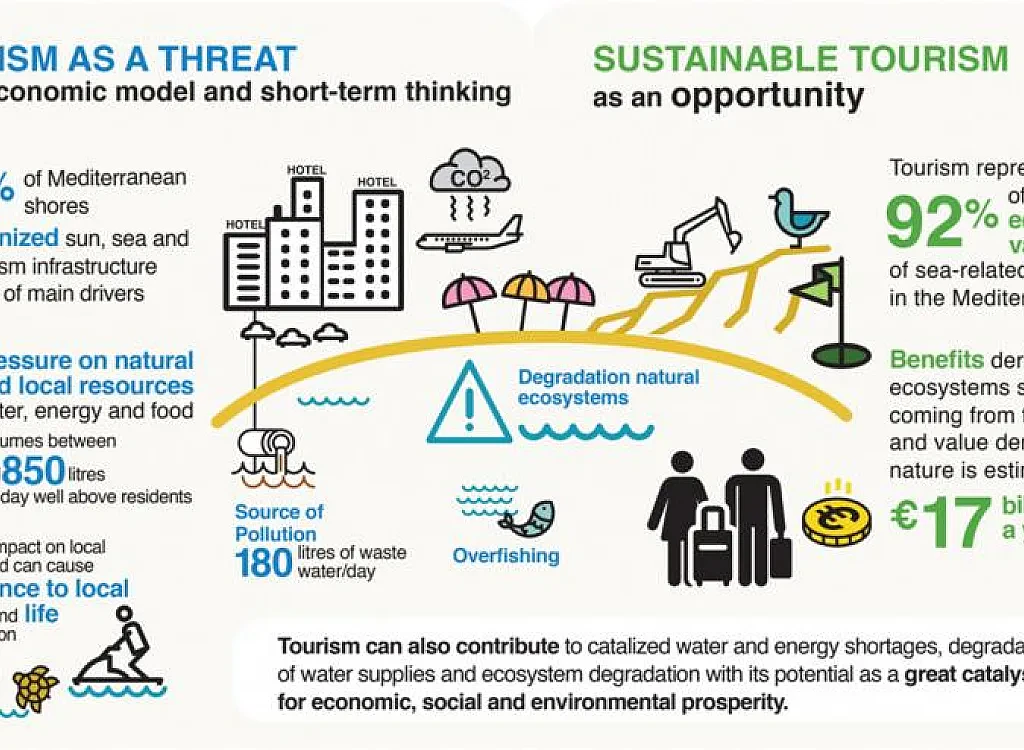The words 'sustainability' and 'sustainable tourism' seem to be familiar to an average person, but the two words have different meanings. In short, the concept of sustainability emphasizes avoiding the depletion of resources, whether it is economical, environmental, or cultural. Sustainable tourism is where tourism focuses on respecting the culture of the environment and people. Unfortunately, most people do not travel in this way.
Most of the tourists do not implement sustainable tourism. More than the average traveler participates in mass tourism, which offers hotel packages, cruises, beach parties, and others. Where sustainable development provides interaction with the local environment and culture, mass tourism focuses on generating income. This generated income whatsoever doesn't go to local communities, environments, or residents. It gets a transfer to the transitional companies rather than remaining in the country tourist visits. Moreover, at this point, sustainable tourism comes in handy.
Why Sustainable Tourism?
Sustainable Tourism aids in making a minimum impact on the local environment and culture as its essential tourism vision is narrower. Not only that, it helps in generating incomes and bring employment in the local communities while conserving the local ecosystems. Implementing Sustainable tourism brings a balance of social, economic, and environmental goals. Not only it helps the local environment, but it also manages the threats resulting from mass tourism.
Why is Sustainable Tourism is Important?
The main motive of sustainable tourism is to encourage positive growth for the development of countries and their areas. We all know how much travelers inject millions to billions into foreign countries far from home, and due to this, tourism can be the only factor for change in economics and unstable environments. While tourists visit the place, there is a high alert of the eradication of ecosystems with pollution, local crime, and harming the cultural insensitivity.
So sustainable tourism is the most needed here. With the concept of Sustainable Tourism, we can benefit the people and communities and minimizes the negative impacts that we can bring to the environment. By 2030, the number of people traveling is expected to go more than 1.8 billion, so it's crucial for us to looks after the environment and not destroy it. So that we can enjoy and experience the local culture and environment for even many years.
It will create sustainability for other travelers too. As we have discussed earlier, travel and tourism has great potential of making economic benefits to rural places with cultural exchange and understanding.
Strategies for Sustainable Tourism
The world has already bear the negative impacts of mass tourism, and to minimize these impacts, there are specific strategies for Sustainable tourism. The plans are mainly based on comprehensive, regional, and more holistic analysis.
Before making the strategies, there was a study carried out on different sectors. One is the analysis of the tourist's areas of interest like social, cultural, and environmental aspects. Another is the analysis of visitors' tourism assets and the constraints on future tourism development. After the analysis, the following are the strategies developed for sustainable tourism.
There should be active participation of both local and the tourism industry in every plan-making and on-going decision making.
The people who are working in the field of sustainable tourism development must not know about tourism but also skills on the development of social, economic, and ecological aspects.
Cultural and natural values attract tourists, and they should know the sites, and their protection will help and encourage locals to invite more people all over the world.
Most of the travelers go online for the destination; this is where the internet comes in handy — the extensive consultation through the internet.
Local people must be happy with the effects that tourism has positively brought to the community. They should also be aware that not only the visitor's influx will not overwhelm their lives and increase the economy but also invites an unwelcome effect on their environment and culture.
Others Include
- Support the valuable features of the sites and aid in their protection
- Minimize the load on the environment
- Strengthen local aspects
- Promote the use of websites to increase well-being and health.
- Do's and Don't for Tourists
While visiting their destination, tourists should treat it as their own home. Just like their home, there is a basis for sustainable tourism etiquette that will aid in causing harm to the environment.
- Littering everywhere should be avoided.
- Be loyal to people, and don't break any rules.
- Try to stay in a locally owned hotel or resort.
- Avoid trafficking wildlife or feeding them or activities that exploit their habitat.
- Try not to go on safari on elephants, most of them are tortured for your pleasure.
- Goals of Sustainable Tourism
Inclusive and Sustainable Economic Growth
As we have discussed earlier, the main focus of sustainable tourism is not only to conserve the local resources and environment but is to uplift the economy of the local people.
Environment Protection
Sustainable tourism takes care of the ecosystem. It raises awareness for the conservation of heritage and wildlife. Not only the wildlife but the respecting of the culture and people are the main emphasis of it.
Resource Efficiency
Sustainable Tourism not only depletes the impact of mass tourism but also helps in maintaining the resource efficiency environment. It will nourish the resources that have been impacted by tourism. Although it takes time, it is no late for changes. Mutual understanding There will be an exchange of the culture and creates an opportunity that trust among local people and tourists, which benefits travelers and local by exchanging of the culture and creates less racism.
Global Impact of Sustainable Tourism
If we respect the local environment, their people, culture, and ecosystems, then there is more trust built. Finally, that benefits travelers and locals by exchanging the culture and creates less racism. Travelers who prefer sustainable is a conscious traveler. They respect the heritage of communities and believe in social equality. So making sustainable tourism mainstream not only helps in economic development but also aids in evolving as a society towards harmony and respect towards people and nature.







Comments